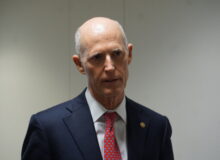Inventing the Business Cycle
The banker had no problems. Far from it. His bank prospered and grew quickly because everyone wanted to gain more money on their unused gold and he gave more interest than anybody else. From their limited perspective, they earned plenty.
Their Limited Perspective
The banker received gold. But now he paid 10% interest. Lenders who were used to getting 5% thought that 10% was a great deal. They were getting double what they were used to getting. And, he was lending at only 10%, unbelievable. Yeah, right. He was paying 10% on a thousand but getting 10% on ten thousand. He was paying 100 but getting 1,000.
So, from their limited perspective, gold owners were making a bundle, (100). But from the banker’s perspective it was a pittance. He was getting a fortune (1000 – 100 = 900). It was made from thin air and the gold wasn’t even his. (OK, eventually it was. After a while he had so much gold he didn’t need depositors to start his own bank.) So, yeah, he had to pay the “exorbitant” 100 or 10% interest, but of the 1000 he got in interest, he still had 900 left over for himself.
The Monetary Accordion
As the banker’s confidence grew, he started to play. The instrument he played was the “monetary accordion”. When he expanded it the money supply filled up with air and prosperity bloomed, when he squeezed, he took the air out, shrunk the money supply, and terrible, fascinating things — train wreck things — happened.
So, here we are again hearing the banker think to himself: “If my monetary base is 1,000,000, and 10% is my fractional reserve, I divide 1,000,000 by 10% giving me 10,000,000. That means I can lend 10,000,000 if my fraction in my ‘fractional reserve’ is 10%. But, if I raise the fraction to 20% then I can only multiply by 5 because 1,000,000/.2 = 5,000,000. OK. But I’ve seen what happens if I make the money supply shrink.”
“People stop buying and get unemployed. Aha, but that benefits me too, because I have the mortgages. If they’re unemployed and can’t pay they’ll turn over their deeds, titles and all the other liens and I’ll get more than 5,000,000 worth of real values from the time, effort, and energy that they used to create real values from money I created out of thin air. And, to make sure that happens quickly, I can double the interest rate I charge and still have the same interest income coming in to me. So, I get 5,000,000 worth of values out of the 1,000,000 of other peoples gold.”
When he reduced the reserve, when he made the fraction smaller, when he took in more mortgages, when he stretched out his hands to give more loans, he filled the accordion with more air, and created more money. When he created more money, he lent more to industry, businesses, individuals. They prospered.
But, when he squeezed, he made the fraction bigger by making the air smaller. When there was less air in the money there was less money. He stopped lending and called in loans, demanded payment in full, right away, then industry stopped buying raw materials and dumped their inventory for less than cost so that they could make the loan payment. They were caught in an “economic depression” that was his word cover, his smoke screen, for squeezing the air out of the money accordion. (They squeeze the air out in the financial and commodities markets by raising the maintenance margin. In all banks throughout the world by increasing the “capitalization requirement.” In any bank by raising the “reserve rate.” For any business/industry by creating a credit crunch. Same concept, different words.)
The Thrill of Victory, the Agony of Defeat
The banker knew that when there was more money, there was more work, more construction, more prosperity. He could make that happen by lowering the fraction in the fractional reserve so he could lend more money backed by air.
And, he also knew that if he raised the fraction in the fractional reserve and stopped lending, called in the loans, raised the interest rates and asked everybody to pay, then businesses stopped buying, laid off workers and dumped inventory to make the loan payments.
He also observed that they weren’t suspicious of him. Their past success made them think that they wrote their own destiny they were the masters their own fate and the rulers of their world. Had they not been swindled so badly, that could have been true.
But, because they credited themselves for their success, they also blamed themselves for their failure. Ahh, the thrill of victory, the agony of defeat. Who could convince their ego that they were not in control of their success or their failure? It’s the money, stupid.
When they couldn’t pay, the debtors presented their deed for property, house, factory, business, or whatever he had mortgaged and humbly asked the banker to forgive them for letting HIM down and to please take their property and not take legal action against them because they forfeited on their obligation.
They were so sorry that they couldn’t pay the loan, that they asked for the bankers forgiveness. Think of the irony, the sadness. But, before the emotion carries you away, think of the fraud and swindle perpetrated by the “monetary base” and “fractional reserve.” By moving from sad to mad, the next step is “I’m mad as hell and I’m not going to take it any more.” That’s the spirit!
The Banker saw Power
Let me assure you that the banker saw neither irony or sadness. HE SAW POWER. Not only could he cause misery to many whenever he wanted, but they humbly and guiltily presented their deeds so that the banker would “do them the favor” of accepting more than 100% of real value for something the banker had risked less than 10%.
“Laughing all the way to the bank?” Hell, he just sat there. It is HIS bank.
It is because the debtors attributed being forthright and honest — to giving value for value — with everyone with whom they dealt. They couldn’t imagine that the “honorable” banker whom they had “known” all their life CAUSED the money shortage, and resulting loan defaults with malice not only aforethought, but carefully planned for maximum damage.
Someone who knows that you have to water the plants, feed the animals, DO THE RIGHT THING in order to survive just will not believe that someone is prospering by doing the unethical, immoral, dishonest thing. It goes against everything good they believed. It goes against their ego, and producers are so generous that they project their ego on those they deal with. They refused to believe that the banker caused it BECAUSE he wanted to steal their property. They refused to believe that the banker raised the fractional reserve to squeeze every possible cent out of the producer. His whim, his greed, was the only cause of the money shortage. Stick that in your econ Ph.D. and smoke it.
It Was Never There
The money shortage occurred because the gold to back up the money was never there, he created money from his “fractional reserve”. Once the banker discovered this power, he found new and inventive ways of using it whenever he wanted more riches. He could stop lending, increase interests, steal deeds, or do a very large number of things to increase his riches. And when he wanted to convert those riches to money, he would just reduce the reserves, make money easy to get, and start the whole prosperity cycle again, so he could cash in his deeds the next go around.
So, to make sure we understand the effect of raising and lowering fractional reserves, as usual we start with 1,000,000 in gold. If I lower the fraction of the fractional reserve to 10% I can “generously” and fraudulently lend the community 10,000,000 in money which is 90% backed by air. These loans let industry make more, businesses sell more, and there is more employment all around. Oh, and another thing, there are fewer thieves, because with the people more protected and stronger, it is easier and less risky to work than to steal.
And again going into the bankers thoughts “This is good for everybody, even me, for a while, but if I don’t stop prosperity before they pay off their mortgages and liens I won’t be able to foreclose.”
OK, I’ll just stop lending, start collecting the loans and raise the reserve to 20% instead of 10%. And, just to make sure I don’t lose any interest income, Ill charge 10% instead of 5%. By raising the rates, more people will have to turn in more property more quickly and pay off their loans more quickly. I get to keep the same income I had at 10% because I doubled the interest rate charged so I’ll get to the 20% reserve rate more quickly.
That way I can start a whole new crop of suckers to make my wealth grow. Less money = less prosperity for them and more property deeds for me. But I have to make sure that nobody believes I’m the cause because I shrunk the money supply. I have to have a justification that puts the blame on them.”
“Inviolable Economic Laws”
He remembered how the debtors reacted when he took their deed. The last part of the secret began to form: To hide his deeds in the open, he caused guilt by attacking the debtors ego. He made the debtor feel like a criminal by making an example of “the deadbeat,” taking legal action to show all debtors that law favors the lender and never the debtor.
Hell, it became so common to blame ego for everything people started to say that all the bad in the world was caused by “egotistical bastards.” But it was only the “egotistical bastards” who were helping others prosper, one by one, while the parasitic “altruists” were skimming the top from programs for “social reform”.
The producer’s ideology is capitalism, whether he knows it or not. He bases his actions and his life on reason and contract. He does the right thing because nature requires it. It is not opinion, it is physics. Understanding physical reality is what causes buildings to stand, plants to grow and machines to function. When we know we should do the right thing, the ego sets truth as a goal. But in that nobility is the weakness of the ego. If he does the right thing and it turns out wrong, the ego blames the producer first.
That is the parasites open window of opportunity. When the debtor accepts the guilt, the banker can say: “Economic laws are inviolable. It’s your fault we have no money. You industrialists have gotten greedy. You employees have become wasteful and slothful. You farmers have become lazy and inefficient. All of this has caused misery and poverty.” And everybody believed this lie. The cause was lack of the mechanism for interchanging values — money — and the banker was the only one in control of how much and how little.
His ego makes him believe that he is in control because he is doing the right things. So, his first reaction is doubt: “Maybe he’s right, maybe I could have done better, but I don’t see how.” His doubt soon turns to questioning himself and finding thousands of ways he could have done better. Then he blames himself for not only for having done less than he could but for not thinking about it sooner. The only thing he refuses to consider is that he is not in control.
The best ally of the banker was to weaken producers’ and debtors’ ego with doubt and guilt. He blamed them for not having money when he was the one that took it away by raising the reserve, calling in the loans and raising the interest rates.
The gold was never there. What he removed was air from his monetary accordion and they all danced to the tune he played. Lower reserve, more loans, more prosperity. Raise reserves, less loans, more scarcity, more poverty (and he gets more deeds to real wealth that people created with blood, sweat and tears).
Inviolable economic laws — Bah! Humbug! The banker shrunk the money supply. That’s the long and short of the whole business cycle that he designed, created and controlled. Stick that in your “I can manage” MBA and smoke it. It ain’t in your “highly leveraged” control.
Continued in http://planmon.tk Secrets (My website is informational, no charges, requirements, ads or fees.) Other topics within are Environment (to know how we got to the pitiful state we are in and how to get out), Monetary Plan (to eliminate taxes and debt in a completely national economy — its simple, but not easy.)
Tags: Banking fraud money




















Join the conversation!
We have no tolerance for comments containing violence, racism, vulgarity, profanity, all caps, or discourteous behavior. Thank you for partnering with us to maintain a courteous and useful public environment where we can engage in reasonable discourse.